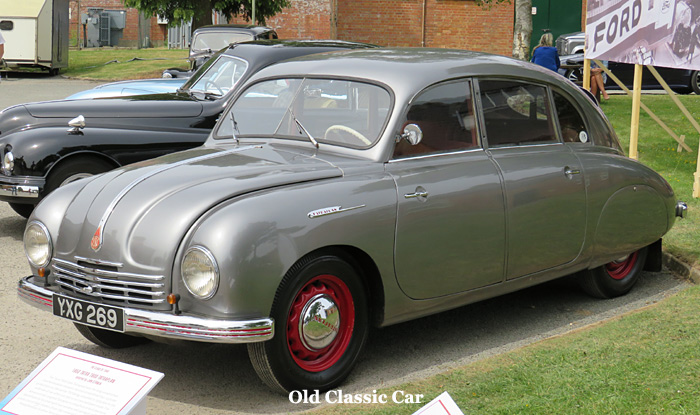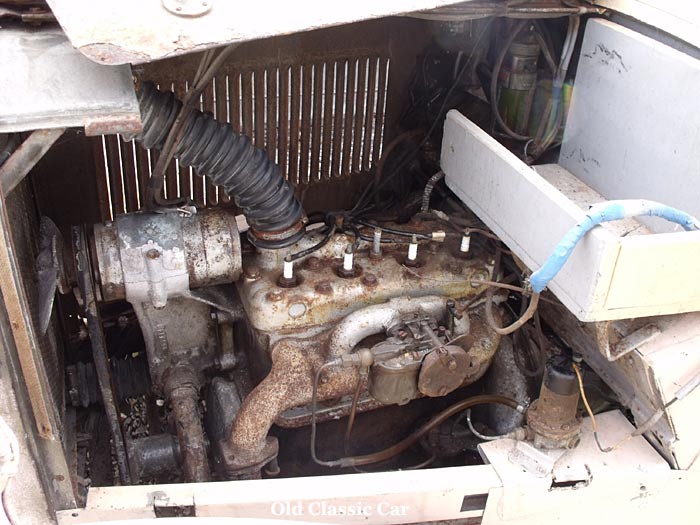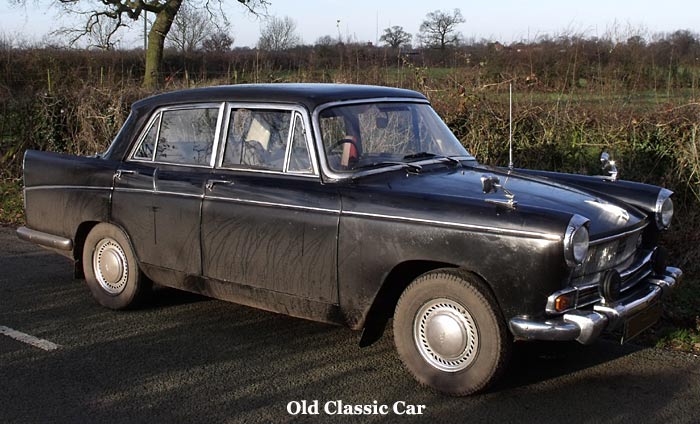

|

|
| See Homepage. | This page: Ten tips to help you cut costs. |
Reduce the cost of motoring with these 10 tips.There are many ways in which the cost of motoring can be reduced, some of which are dealt with below. Depending on your situation, and the country you live in, some of these tips will be more relevant than others, but hopefully they'll shed some light on possible ways to save money when running an older car, including modern classics. |
1. Buy a secondhand car. |

|
| Maybe not the first car to consider when thinking about a daily-driver, but ... |
|
In the UK at least, there are some benefits to buying a car built 40+ years ago as you qualify for a zero rate of roadtax, which can make quite a difference to your annual motoring budget. Not all 'classic cars' are great for daily use, or high mileages for that matter, but if you do local journeys, and are handy with a spanner, considering the purchase of an oldie can save quite a few bob, if bought wisely.
New cars suffer a crippling rate of depreciation, with anything between 30-40% of its new-car value disappearing down the road in just the first 12 months, with anywhere between 20-40% being wiped off each subsequent year. Tempting deals of free insurance and low screen prices are not always a good bet in the long term, when the car's eventual re-sale value is taken into consideration. If you still need a modern car to drive, and a classic is not a viable option, hunt down a low-mileage 3 year old car with full history and so on - at least the car will have many miles left under its belt (unless it is a thrashed repmobile or rental car), and any new-car niggles will have long since been ironed out. If you're not interested in impressing the neighbours with a shiny brand new car in the drive, on the latest registration plate, why not buy a shiny little-used example instead, and blow the saving on a nice holiday instead? |
2. Run your car on LPG.Unleaded and diesel fuel prices are showing no signs of ever returning to sensible levels, especially thanks to the sizeable chunk that Mr Chancellor pockets from every 1GBP of fuel you pour into the petrol tank, via petrol duty and VAT. High mileage drivers could well save a chunk of cash by considering either a car built from new to take Liquified Petroleum Gas (LPG), or converting an existing car.Conversion costs vary considerably depending on the complexity of your car. Someone I know has LPG fitted to his Morris Minor, and I suppose a simple modification like that may cost 1000-1200 GBP or so, perhaps less if you shop around. More complex cars of recent times, laden as they are with ECUs and black boxes, may cost 1500-2000 GBP or so. Do your sums carefully. If you plan to keep the car for a few years, and regularly cover high mileages, the numbers may well add up. Worth checking anyway! At the time of writing, unleaded pump fuel costs around 1.35p a litre in the UK, whereas LPG comes in at around 0.65p. Other alternatives to fossil fuels are being worked on, and the prospect of mass-adoption of electric vehicles is looking like an increasing possibility. |
3. Car Insurance.Shop around for insurance. Some spectacular savings can be made by spending time comparing quotes next time your policy is due. Not all policies are equal though, with different companies having different policies about no-claims discount, accident repair services, breakdown recovery, and so on, but do a little homework and you can literally save 00s. Some companies specialise in certain segments of the market, such as older retired drivers, or those that offer insurance solely to the female breed of driver.If you run a modern car, but also run a classic, you can cut your motoring costs by insuring the latter on a specialist classic car policy, sometimes agreeing a maximum annual mileage, to further cut the cost. Classic policies don't usually accrue no claims discount, and all the ones I've seen are Fully Comprehensive only (ie no 3rd Party policies) but can save you quite a bit. Many require you to have a main family car on a normal policy. Some classic car clubs offer discounted schemes to members, so joining a club for 30 GBP a year could net you much more than this, simply by taking up their offer of discounted rates. |
4. Breakdown Recovery.It can be a real saving if you take out breakdown recovery with any of the well known providers. Roadside assistance may cost you a hundred pounds a year (say), but can save you (or your partner) a great deal of aggravation if the car breaks down. And yes, it can be a money saver - if you break down and require a garage to come out and collect you, or transport the car from the scene of the breakdown, back to your house, that can easily cost several times the cost of taking out a breakdown (with recovery) policy. Well worth considering, even if your car is fairly new, if only for the piece of mind and knowledge that should you need transporting home or to a garage, the costs are covered. If you run a classic car, which has a tendency to "fail to proceed" occasionally, then it really makes sense. |
5. Do your own maintenance. |

|
| Things were much simpler in the 1930s ... |
|
This has been touched on elsewhere on this website, but doing your own maintenance if you're that way inclined, can be the biggest saving you can hope to make when running a car. Garages will swiftly empty your wallet (they do have large overheads mind so the costs aren't surprising), but if you can do all your own maintenance, or even just do the simple stuff yourself, your bank balance will be much healthier for it. Routine stuff like changing your oil and filter, and fitting replacement brake disks & pads, is usually fairly straightforward if you follow the instructions in a manual, and with garages charging 50-100 per hour in labour, there's a saving already. Save yourself a few hours of workshop labour and that's one year's roadtax covered. If you're at all unsure about your abilities however, do not fiddle with your car without first receiving some instruction, especially when it comes to replacing brake components. Don't be put off from doing it, but equally don't go in without knowing what you're doing first either.
A regular programme of preventative maintenance (checking levels, tyres, headlights etc) not only familiarises you better with the car, but can also highlight the beginnings of a problem before it turns into a major headache, or expense....so keep an eye on oil and gearbox levels, and top up the screen washer fluid while you're at it. If your idea of motoring is to buy a real cheapie for a few hundred quid, and drive it into the ground, doing your own maintenance is the only financially viable option in most cases. As well as the straightforward tasks already mentioned, if your idea of a fun Sunday afternoon is cutting out a section of rusty floorpan, and replacing with fresh steel, it will be Very beneficial to teach yourself how to weld. Hobby-size welding gear can be purchased for around 200 GBP for something half-decent, and add on a bit more for gas, welding visor & gauntlets, wire, and other sundries. Having any welding done on your car, whether a classic being rebuilt, or a daily user being gifted a few more years of use, is very expensive when you farm it out to a garage or mobile welding outfit. Odd jobs are ok to be farmed out, but regular welding jobs are much more cost-effective if you teach yourself how to do it. All welding takes is practice, and rigid adherence to the safety instructions that come with the welder. If you've not done it before, book yourself on a nightschool course and learn from a pro. before you start angle-grinding large chunks of grot from your car's bodyshell. For general jobs around the garage, a Mig welder will easily be up to the job, with a 150amp job suitable for all but the heaviest hobby work, such as welding up ultra-thick plate. |
6. Driving to save money.Even if none of the previous advice is relevant to you, and lifting the bonnet of your car is left to those with pre-oiled fingernails, there are some things that every driver can do to try and save money. A light right foot can make a huge difference to fuel economy, and therefore the cost of motoring. Caning an engine in low gears might get your up to speed slightly quicker than the more leisurely approach, but it'll drastically increase your use of fuel. Try and drive smoothly, making best use of gears to minimise strain and work on the engine. Most automatics have a manual override so there's no excuse for being in the wrong gear. Aim to be in the highest gear for a given speed, without letting the engine labour.Even something simple like getting your tyre pressures right can save fuel. Garage tyre gauges are often less-than accurate, so buy a decent quality pressure gauge, and check your tyres often. While poking around down there, have a quick look at the front tyre treads for any signs of uneven wear - this is often caused by incorrect wheel tracking, that not only causes extra drag in extreme cases, but with rapidly shorten the life of your tyres (another major motoring expense!). Keeping your tyres in good nick can easily make the difference between them lasting 15,000 or 30,000 miles. Driving style also dictates how long your tyres will survive, so avoid wheelspin, lockups under braking, excessive cornering speeds, and perhaps worst of all, bouncing up and down kerbs when parking. The latter can cause serious damage to the tyre walls (sides) which not only damages their structure, but can also make them dangerous. |
7. No mud!? |

|
| My old Austin Cambridge regularly saw mud during active service. |
|
If you're really really lazy, your car will not have seen the damp side of a sponge for many a year. Yet this too can cost you money, and in some perhaps surprising ways. A filthy car will not cut through the air as well as a clean one, so may slightly impact your economy. Accumulations of mud under the wheelarches rarely dry out properly after wet weather, and are the main causes of rot forming on the lower edges of wings, sills, and floorpans. Wash your car regularly, and hose out (or jet wash) the wheelarches nice and often too. Make sure there are no build-ups of mud and general clag under there. Nice clean arch lips dry off quickly when they are clean, but muddy ones will stay damp for weeks. Something simple like this can have a big influence on the value of an older car when it comes to selling it on, as few are worth spending serious money on for professional body repairs.
If you persist in driving a car that looks like it has spent the last ten years driving through a slurry pit, the Police might decide to have a word with you. They are getting ever keener on being able to clearly read your registration plates with their camera technology. Even if you're fully insured, taxed, and so on, the authorities are routinely photographing your moves as you drive innocently around this sceptred isle (don't get me started..), and if they can't get nice clear snaps of your car to store on their databases, they get very upset. I believe (please correct me if I'm wrong) that it is an offence to have an illegible number plate, and this goes for one plastered in mud and horse muck, so simply keeping the number plates clean might save you money one day! |
8. Car sharing.If you and fellow work colleagues live near to each other, why not form a car sharing pool? just using your car one or two times a week for the daily commute, as opposed to every day, will have a dramatic effect on your annual mileage, fuel bills, and general wear and tear on your car. |
9. Use your garage. |

|
| Not all garages are very effective mind ... |
| How many houses out there have fully functioning garages, yet are just used to store general clutter and worthless junk that doesn't fit anywhere else? cars cost serious money, so it seems crazy to leave them outside, exposed to not just the elements but also passing low-life, just because the garage needs a tidy-up. Get your car locked away in a garage, and most insurance companies will look on you more leniently when it comes to calculating your premium, so it makes sense on so many levels to use a garage if you have one. Plus the car will be cozier to get into on winter mornings, with no need for scraping ice off the windscreen. The engine will also warm up quicker than if it has been left outside all night. |
10. Keep it warm.For ultra-speedy engine warm-ups, think about fitting an engine pre-heater. This simple device is plumbed into your coolant system and keeps the water temperature up, lessening the time that an engine needs to run on enrichment (choke to the old guys out there) first thing in the morning. Less choke equals less fuel usage. The heater plugs into a domestic socket and is left on overnight, or can be placed on a timer to kick in during the early hours. |
| Hopefully one or two of these tips will be of interest, and even just actioning a couple of these hints about saving money, will hopefully help your bank balance a little and reduce your motoring expenses. |
|
|

Custom Search
|
 |
| Old Classic Car (C) R. Jones 2023. Content not to be reproduced elsewhere. |
| Website by ableweb. |
| Privacy Policy, Cookies & Disclaimers |